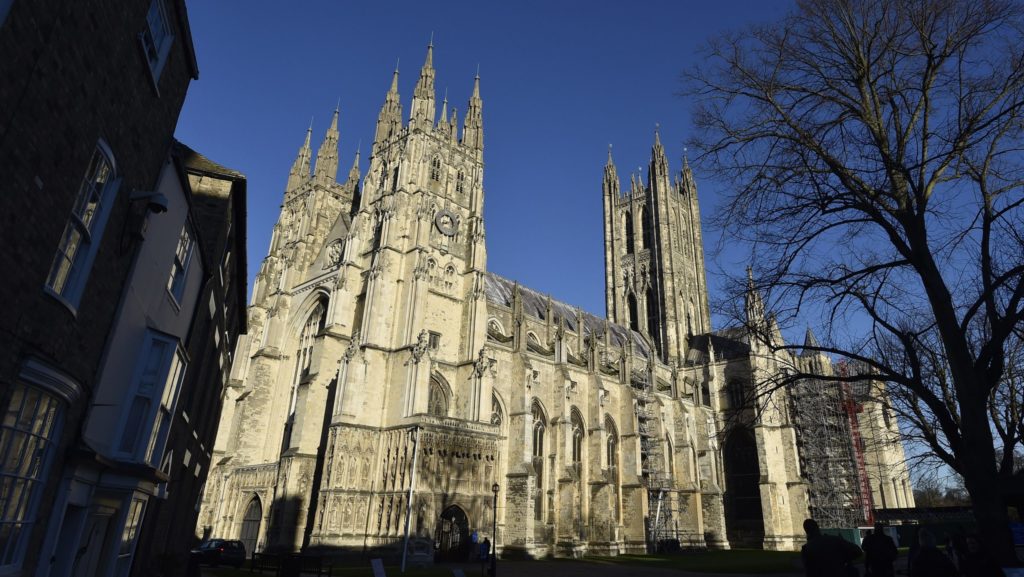In July, I learned how far behind the curve I can be from Church history and current events. It was news to me discovering that a Catholic Mass was celebrated within the hallowed walls of Canterbury Cathedral. I did know that the cathedral has been at the heart of the Reformation in Great Britain for 500 years, and even today serves as the seat of the main prelate of the Church of England.
I also know its significance goes much further back in time. Granted, the bulk of my knowledge of medieval Church politics comes from multiple viewings of the film “Becket” starring Peter O’Toole and Richard Burton. That may not qualify me for a tenured position in the history department at Cambridge, but it did spur me to go deeper into the religious upheaval brought about centuries later by King Henry VIII. In both epochs stood the Canterbury Cathedral.
I have since learned more things about this sacred space, one being this was not the first Catholic Mass there since the Tudors. That happened in 1980. What makes this one so special is that for the first time since Henry VIII, Mass was celebrated by none other than the papal nuncio to the United Kingdom, Archbishop Miguel Maury Buendia. The sound you may be hearing is Henry Tudor spinning in his tomb. Now, every July 7, Mass is said at Canterbury in remembrance of St. Thomas Becket.
This story made me think a lot about those Catholics in England during the Tudor era. Whether commoner or nobleman, to witness their king — once honored by the pope for his defense of the Faith in the very beginnings of the Reformation, turn on the Church, reject that very Faith he once defended so well, and start his own church must have felt like the end of the world.
This was quickly followed by suppression of the Church and severe persecution by Henry’s daughter Queen Elizabeth. Priests were martyred, monasteries ransacked, and for many faithful Catholics it actually was the end of their world. And for all of those who survived the persecution, it was at best a terrible and utter sense of defeat. Yet, amidst it all, there stood Canterbury Cathedral.
We get upset over a Mass not being celebrated in the exact manner we wish it was. The faithful Catholics in England 500 years ago lost the ability to even attend Mass unless done so in secret, and they lost all access to their beloved churches like the cathedral in Canterbury.
It must have felt like total abandonment and defeat with many bishops and priests opting to climb aboard the winning team’s train and turn their backs on Rome. The Church may have been burnt to the ground, but the embers would not go out. Slowly, in God’s time, not ours, those embers were fanned, and the fire never went out.
I can easily imagine saints like Thomas Becket and the great English martyr Edmund Campion smiling down just a little today seeing the body, blood, soul, and divinity of Jesus being distributed within the confines of a cathedral whose origin dates back to St. Augustine.
Not having attained that level of sanctity as the three aforementioned gentlemen, the temptation for me is to gloat … at least just a little, but that is just the Irish in me.
One can easily see that the Masses now being said on an annual basis at the Canterbury Cathedral have more to do with the decline of the Church of England than the rise of the Catholic Church. There is plenty of evidence pointing to the Church of England’s decline and all the other dark side effects of that slide.
Numerous surveys indicate that the proportion of individuals who do not hold religious beliefs is steadily increasing.
But just a short trip across the Irish Sea will tell a similar story, but this time, the problem is us. A 2024 article in the Jesuit-published America magazine revealed 27% of Irish Catholics attend weekly Mass. That is high by European standards, but not when you consider that number was 91% in 1975.
That is a sad statistic in and of itself and feels like more abandonment and defeat. Just the kind of hopelessness God responds to. And we can rest assured that God notices, and he will take care of business just like he seems to be doing at the Canterbury Cathedral.
We want answers now. God, not a prisoner of either time or space, will get to it when he gets to it. So let us all rest easy. God will find a way to set things right, even if it takes 500 years.

